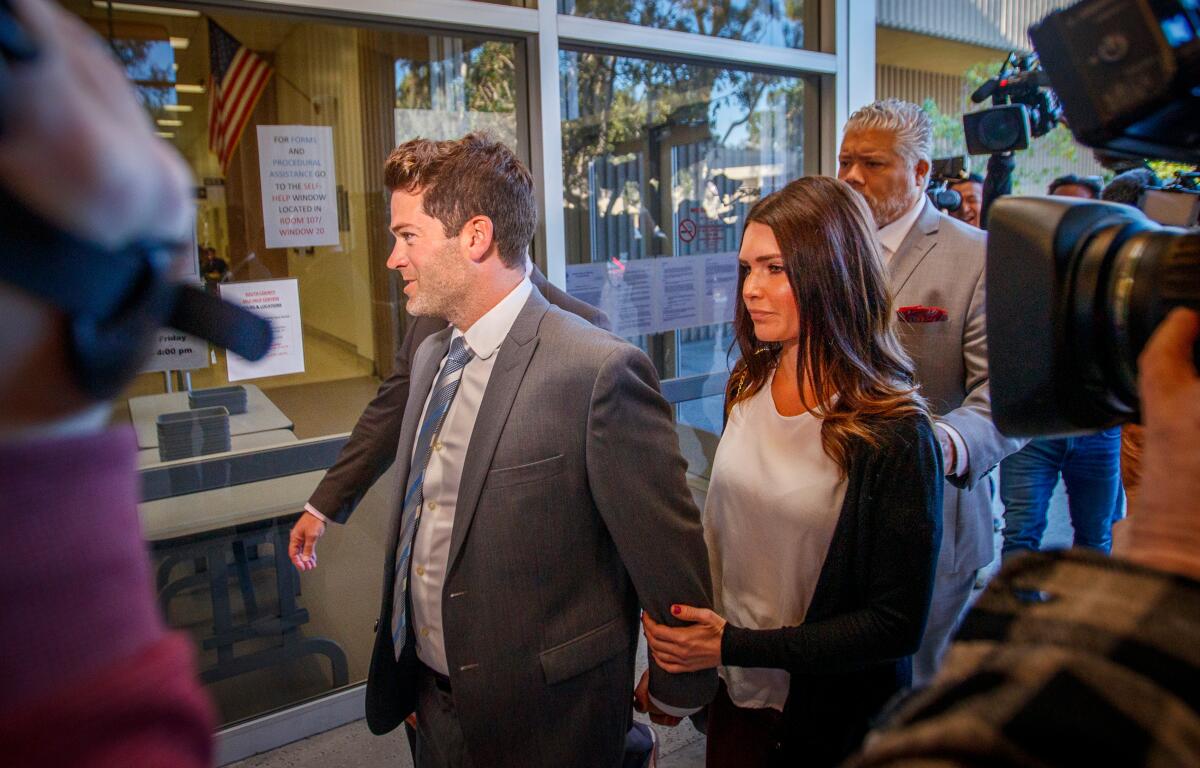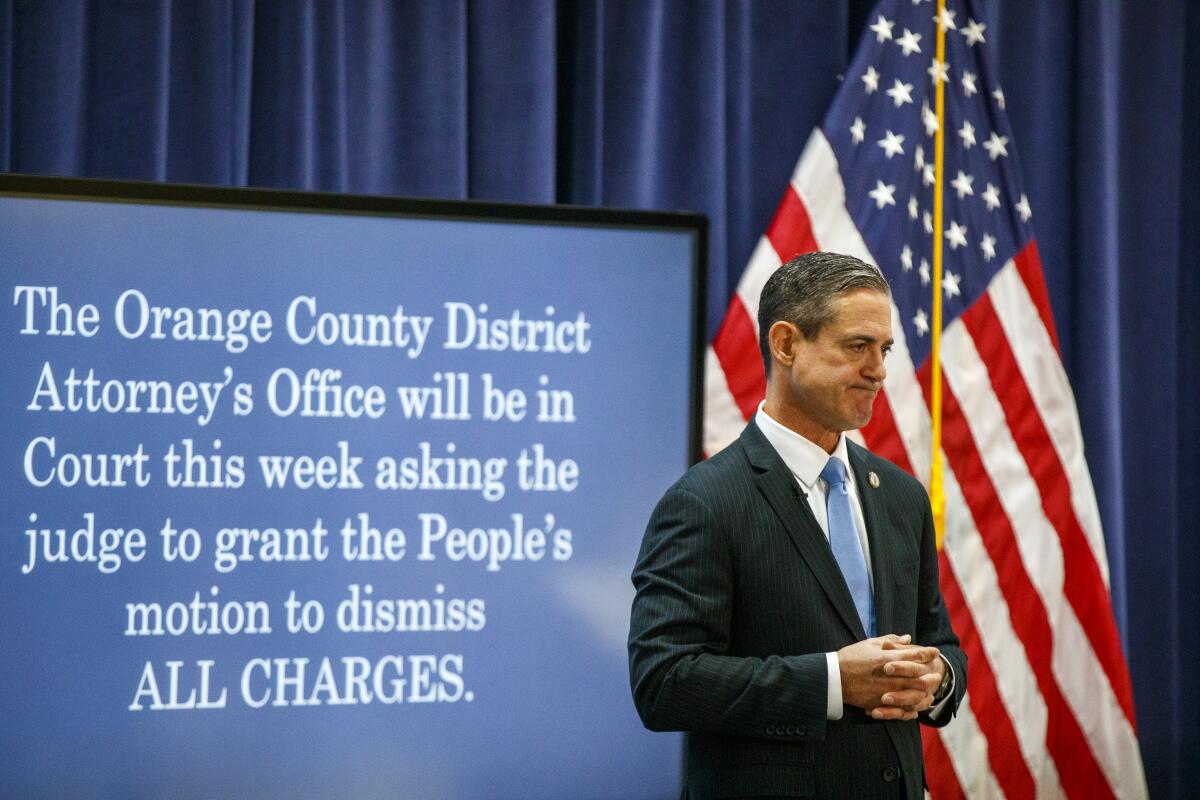Stunning twist in sensational case: Judge puts off decision on Robicheaux rape charges

- Share via
As soon as it hit the news in 2018, the sensational serial-rape case against Newport Beach hand surgeon Grant Robicheaux and his girlfriend, Cerissa Riley, became tangled in a bitter political feud between Orange County’s top prosecutor and the man who would succeed him.
Looming over the apparent wreckage of the case, 16 months later, is the question of what role the political spat between longtime antagonists ultimately played. It was a question that Orange County Superior Court Judge Gregory Jones wrestled with Friday, openly expressing skepticism that what prosecutors are now seeking — the dismissal of rape charges — equaled justice.
“Politics have infected this case,” Jones said. “Mixing politics with prosecution gives you a toxic cocktail.”
In a rare, stunning move, Jones declined to do what judges almost always do, which is to automatically approve prosecutors’ decision to drop a case when they say they can’t prove it.
Instead, after grilling prosecutors for hours and listening to wrenching statements from two of the accusers Friday morning, Jones said he wanted more information about the facts before deciding what to do.
Orange County Dist. Atty. Todd Spitzer wants to drop all charges against Robicheaux, a doctor and former reality-TV personality who was charged with sexually assaulting seven women, and against Riley, a former schoolteacher who was charged with five.
The judge’s refusal to scuttle the charges seemed a bitter surprise for the defendants, who began the day with an appearance on “Good Morning America,” where Riley said, “I feel like I finally woke up from a bad nightmare and feel like I can breathe again.”
By morning’s end, Riley was slumped weeping against Robicheaux’s shoulder in court, and the defense had withdrawn an offer to make the couple available for further interviews.
“It’s a terrible thing when the elected district attorney has so politicized a case that the judge doesn’t accept at face value that you’re seeking justice,” said Brian Gurwitz, a former prosecutor and longtime defense attorney who is unaffiliated with the case. “I don’t recall this ever happening in the 25 years that I’ve been practicing law in Orange County.”
More from Christopher Goffard
Spitzer and two of his staff prosecutors spent the morning insisting to the judge that the case against Robicheaux and Riley was not provable. “We scoured the evidence in this case,” said prosecutor Richard Zimmer. “We went through every single victim’s statement.”
The judge asked Zimmer to detail what drugs had been seized from Robicheaux’s home when it was searched, a list that included cocaine, ecstasy and GHB, a tranquilizer sometimes referred to as a “date rape” drug.
“Did you take into consideration the corroborating value of the drugs?” the judge asked.
Yes, Zimmer replied — but it wasn’t enough to prove the case. His office could not prove that the defendants believed their accusers incapable of sexual consent, he said.
Michael Fell, an Irvine attorney who represents an accuser known as Jane Doe #4, said that his client was devastated by Spitzer’s decision to drop charges and maintained that she was drugged and attacked in October 2016.
“I know in my heart of hearts that I was sexually assaulted that night and that I will never be the same,” the woman wrote.
A victim’s advocate then read a longer, more detailed statement from an accuser referred to as Jane Doe #1, who said Robicheaux attacked her in 2009.
“One of the worst days of my life was when I was raped by Grant Robicheaux,” the woman wrote, saying she was a first-year law student at the time and did not initially report the incident because she feared it would derail her career and hurt her parents. “I suppressed this horrible experience.”
Jane Doe #1 said she decided to approach prosecutors after she saw that Robicheaux had been charged in September 2018, but felt guilty because, she said, “I didn’t stop him when I could.”
She said the defense team had unleashed a “campaign of harassment” against her, calling her office, sending a process server to her parents’ home, and making one of her best friends testify about her sexual habits in a civil case. She said the defense team’s behavior ultimately forced her to tell her father, who was in his late 60s, that she had been raped.
Jane Doe #1 then took aim at Spitzer, saying he had never met with her and that his office had given her scant notice — “less than 10 minutes” — before the news conference at which he “apologized to the man who raped me.”
Zimmer, one of the prosecutors, responded to Jane Doe #1’s statement by telling the judge: “It’s not that we don’t believe her.”
The judge shot back: “But a jury might believe her.”
The judge scheduled another hearing for March 19.
After the hearing, Spitzer said he would be “more than pleased” to share the evidence with the judge, whose decision to inform himself about the facts he called “completely reasonable.”

In 2016, two women in separate incidents told police that they were taken to Robicheaux’s 44th Street house in Newport Beach and assaulted. One woman described Robicheaux and Riley as a “Bonnie and Clyde” team.
When then-DA Tony Rackauckas announced charges against Robicheaux, 38, and Riley, 31, in September 2018, Rackauckas was in the home stretch of an acrimonious reelection campaign, fighting to keep the job he’d held for 20 years.
The story he told — of a telegenic couple who lured women with their looks, slipped drugs into their drinks and sexually assaulted them — generated widespread coverage.
But Spitzer, Rackauckas’ opponent and former protege, wasted no time in attacking Rackauckas for the timing of the rape charges.
Rackauckas had delayed the charges for political effect and thereby potentially endangered the public, Spitzer suggested. He noted that it had been more than two years since Newport Beach police received accusations against the couple, and eight months since the search of Robicheaux’s house.
“How many more women were exposed to illegal acts since 2016 when these allegations first came to light?” said Spitzer, who won the election two months later.
The initial charges involved two accusers, though after the case became public other women came forward, and charges involving five additional women were filed. The couple pleaded not guilty and denied having nonconsensual sex with their accusers.
Compounding the media fervor was the sheer scope of the alleged crimes and Robicheaux’s profile — he was not just a doctor but had appeared on the Bravo reality show “Online Dating Rituals of the American Male.”
Investigators had seized video tapes, Rackauckas said. He suggested there might be hundreds of victims, perhaps “more than a thousand,” a remark that defendants’ attorneys said tainted the potential jury pool.
Spitzer inherited the case when he won Rackauckas’ job and asked the California attorney general’s office to step in because of perceived conflict of interest, but the request was rejected.
Late last year, Spitzer assigned two prosecutors to examine the case. He said they found the case could not be proved beyond a reasonable doubt, and that there was no evidence of nonconsensual sex on the seized videos.
What played a role in prompting Spitzer to reexamine the case were Rackauckas’ remarks in a deposition in the summer of 2019 — half a year after he’d left office — under questioning from attorney Philip Cohen.
Cohen represents Robicheaux both in his criminal case and in a civil suit filed by one of his accusers, an Ohio woman who was in her mid-30s when she says she met Robicheaux and Riley at a Newport Beach Halloween party in October 2016.
The couple slipped the drug GHB into her drink, which caused her to pass out, and she awoke while she was being sexually assaulted, prosecutors had alleged.
In a deposition as part of the woman’s civil suit, Cohen asked Rackauckas about the videos seized from Robicheaux’s house. Rackauckas said he had not seen the videos himself but had discussed their contents with a prosecutor and an investigator who had reviewed them.
“Do you believe there’s about a thousand or so victims of sexual assault/rape depicted on the electronic media?” Cohen asked.
“I think there probably are,” Rackauckas replied.
Cohen turned to the question of publicity surrounding the case amid Rackauckas’ reelection bid.
“Did you see this case of a thousand victims, a good-looking doctor, a good-looking girlfriend, as being a potential publicity vehicle for you?” Cohen asked.
“I certainly expected it to get a lot of publicity, yes,” Rackauckas said.
“And did you think that that publicity may be helpful to your campaign?”
“Yes.”
“And that was the thought — you wanted to help your campaign, I assume. You wanted to get reelected?”
“Of course.”

In an interview with The Times this week, Rackauckas said he was just admitting to the obvious.
“The attorney very cleverly didn’t ask questions about motivation,” Rackauckas said. “Would a case like this create a lot of publicity? Of course it would. But am I motivated by that? No. That has nothing to do with the filing.”
Rackauckas said he still believes that the criminal case against Robicheaux and Riley is a strong one.
“It’s not about video evidence or politics,” Rackauckas said. “Think about what’s being dismissed here — the testimony of seven different victims. To throw that out based on the claim that the statement about the videos was exaggerated doesn’t make any sense.”
Laurie L. Levenson, a Loyola Law School professor and former federal prosecutor unaffiliated with the case, said the case might have hinged on “questions regarding witnesses’ credibility,” and concern that “they are going to get torn up on cross-examination.”
“It might be Spitzer saying, ‘Rackauckas brought this case, and it’s a dog and it is probably a loser, and I don’t want to take the loss for him,’” Levenson said.
More to Read
Sign up for Essential California
The most important California stories and recommendations in your inbox every morning.
You may occasionally receive promotional content from the Los Angeles Times.












